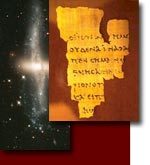| Site Map | Contacts | Links | Newsletter | |
Genesis 1:14-19 DAY 4
Number of Stars
Jeremiah 33:22 says, "As the host of heaven can not be numbered, neither the sand of the sea measured" (also Genesis 15:5, & 22:17). On a clear night in the middle east the stars look like they are innumerable. The point of this hyperbole is that David will have many descendants. If we use a computer to estimate the amount of sand or the number of stars, this does not mean we will then know the exact number of descendants of David or Abraham. This is poetical language, and not a scientific statement. This was a common ancient hyperbole (Bullinger, 426-7).
Akkadian Literature
Shalmaneser I was king of Assyria about 1280 BC. He had an inscription engraved upon a stone tablet (KAH,I,No.13) that describes the rebuilding of the Temple Eharsagkurkurra. It says, "Thereupon, the land of the Kuti, whose numbers are countless as the stars of heaven, who know how to plunder, came down upon me and fought with me, and stirred up enmity" (Luckenbill 1926, 40, #117; Grayson 1972, 83).
Assur-nasir-palís annals are inscribed on the pavement slabs of the entrance to the temple of Urta at Calah. It describes his great military campaigns in the first six years as king of Assyria starting about 1018 BC. In his first year the city of Suru of Bit-halupe rebelled. Assur-nasir-pal captured the city and said, "÷his heavy spoil, which like the stars of heaven could not be counted, I carried off" (Luckenbill 1926, 145, #443).
Assur-nasir-pal in another military campaign said, "As far as Dummete (and) Asmu, cities of the men of Adini, I pursued him (Azi-ilu), and the rest of his hosts, which were countless in number as the stars of heaven, I carried off" (Luckenbill, 162, #472).
Sargon II wrote a letter to "Assur, Father of the gods," about 714 BC. in which he tells in detail the events of his eighth military campaign. Sargon says, "I stopped my march on Andia and Zikirtu which lay before me, and set my face toward Urartu. Uishdish, a district of the Mannean country, which Ursa had seized and taken for his own, with its many cities, which are countless as the stars of heaven, I captured in its entirety. Their powerful walls I smashed like pots, down to their lowest foundations, and I leveled them to the ground. I broke into countless orchards and let my army devour great quantities of food" (Luckenbill, 84, #157).
Greek Literature
Pindar, a lyric poet who lived from 518 to 438 BC., says, "whereas sand can never be numbered, and who could ever count up all the joys that he hath given to other?" Then later on in the same book Pindar says, "for, in truth, I could not have the skill to tell the number of the pebbles of the sea" (Olympian Odes 2.98-100, and 13.46; L&S, 240).
Plato who lived from 429 to 347 BC. in his book Timaeus (39b-d) describes the wanderings of the stars as "incalculable in multitude and marvelously intricate" (Farrington 1961, 218).
When the science of astronomy became more developed the Greeks numbered all the stars they could see. God has numbered the stars and calls them by name (Psalm 147:4; Isaiah 40:26). Hipparchus, the father of Greek astronomy, catalogued a total of 1,080 stars in the second century before Christ. Later Ptolemy still considered this an accurate count (Coder 1965, 45).
Latin Literature
Seneca born about 4 BC. in his book Naturales Quaestiones states, "innumberable planets (stellas) move in secret, unknown to us either on account of the dimness of their light or because the position of their orbits is such that they are eventually seen only when they reach the extremities of those orbits" (VII. 13.3-7).
Next - Creation of Fish
and Birds
Bibliography
